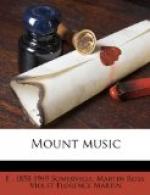Lady Isabel, confronted with these problems, fell back on the manuals of her own youth, with their artless pronouncements on the Righteous, the Wicked, their qualifications, their prospects; and, since the manuals had an indisputable flair for the subjects most likely to seize the attention of the young, Lady Isabel was generally able to divert her offspring’s attention from the Errors of Rome, with digested narratives of “Adamaneve” (pronounced as one word) and the Serpent, Balaam’s Ass, Jonah’s Whale, and similar non-controversial matters.
“Wiser people than you and me, darlings,” she would say, with a slight stagger in grammar, but none in orthodoxy, “have explained it all for us—”
“Larry’s papa and mamma didn’t quite think the same as we do, but we needn’t think about that, my pet!”
“But, mother, Evans says that the Pope—” appalling prognostications as to the future of that dignitary would probably follow.
Unfortunate Lady Isabel! But parents and guardians have, at least, the power of the closure.
“We needn’t talk about it now,” says the hard-pressed mother, “when you’re grown up you will understand it all better—”
With Christian, however, this formula was less efficacious than with her elder brothers and sister. Her questioning, analysing, unwearying brain ignored the closure, and evaded poor Lady Isabel’s evasions. Her religious life had been singularly vivacious, and the scope and variety of the petitions that she nightly offered caused considerable embarrassment to her mother. What was any good Church of England, or Ireland, mamma to do when an infant of four years implores its Deity:
“Make me to have a good, fat, lively conscience, and even if God curses me, help me not to mind a bit!”
The scandalised mamma decided that extempore prayer must be discouraged, and seeking out in one of the manuals a form of prayer of strictly limited range, repressed all additions and emendations.
Obedient to the traditions of her own youth, Lady Isabel, as her children successively attained the mature age of six years, bestowed Bibles upon them, but it was Christian, alone of the family, that applied herself with any diligence to the study of the Scriptures. She began with the Book of Esther (in which she found a satisfaction that in after life remained something of a bewilderment to her), and thence, but this was a year or two later, for no reason that can be assigned, she passed lightly to the Book of Revelation. With it, it may be said, the artistic side of her, that had leaped to sympathy with Larry’s emotion over “Dark Rosaleen” and “The Spirit of the Nation,” awakened, and her artistic life began. That glittering, prismatic chapter, that tells of the rainbow round about the Throne, in sight like unto an emerald, and the Sea of glass, like unto crystal, that was before the Throne, and the thunderings and the voices, and the Voice as it were a trumpet talking. Christian read the chapter over and over again, for the sheer glory of the beautiful words. She, also, knew of Voices, and Music, that other people did not seem to hear. She could understand, and could tremble to those strange shouts, and trumpet-blasts, and thunderings.




